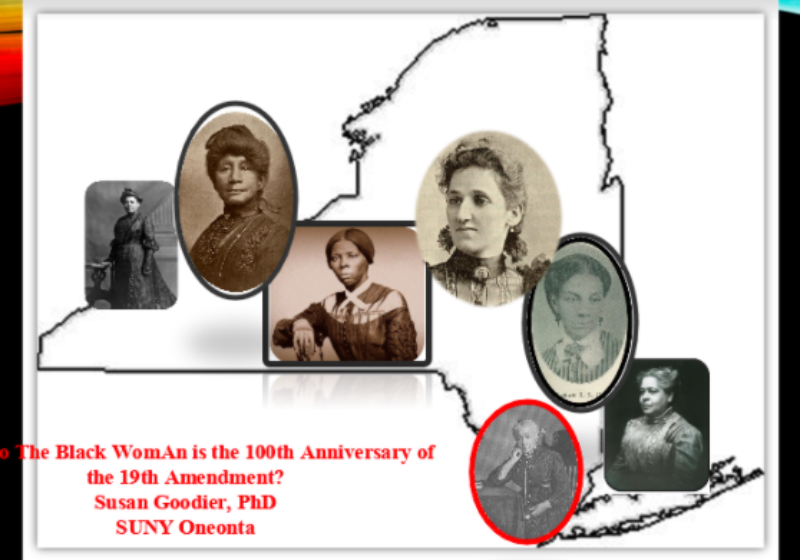Organizers and panelists called for the recognition of Black women’s accomplishments and a mutually supportive activist framework in Monday’s presentation, “What to the Black Woman is the 100th Anniversary of the 19th Amendment?”
The presentation — organized by 540WMain in partnership with The State University of New York (SUNY) Brockport and the Susan B. Anthony Institute at UR — consisted of a lecture and a subsequent panel discussion, both of which examined the role Black women played in the suffrage movement, and how this and other activist movements might be seen under the lens of Black feminism.
“The ongoing state of the world and our community illuminates the need for more intentional conversations about the role and erasure of Black women in how we retell the history of suffrage in the U.S.,” 540WMain founder Calvin Eaton wrote in an email to the CT, “as well as their contemporary contributions to our socio-political landscape.”
SUNY Oneonta Assistant Professor of History Dr. Susan Goodier began her lecture by emphasizing the importance of telling the stories of Black suffragists. She said that they should be “household names, like the names of white suffragists.”
In the early suffrage movement, Black women were very involved due to the inclusion of a variety of causes (such as abolition of slavery), Goodier explained. “[Black women’s suffrage] never focused exclusively on women’s suffrage,” she said. “It was always about other issues, and a much more diverse women’s rights agenda.”
During the panel, an attendee asked whether Black women had ever advocated for Black men to get the right to vote before them.
“Black women advocated for everybody to get the right to vote,” she responded. “They supported Black men’s votes when that’s what was on the table.” She quoted Sojourner Truth, saying, “Why is it that all the [Black people are men], and all the women are white? What about Black women?”
Goodier chose to focus her lecture — as well as her upcoming book on Black women and the suffrage movement — on the movement in New York State specifically. “When you study a […] movement within a state,” she said in an interview with the Campus Times, “you get to look at the connections between people.”
After the lecture, panelists spoke on the importance of activism centered on community support.
UR senior and former CT managing editor Efua Agyare-Kumi offered one answer to the presentation’s central question of what the 19th Amendment means for Black women.
“The 19th Amendment is yet another reminder that the American dream is a lie […] Even though again and again America will tell you to work hard, if you work hard, if you are Black, that will not be rewarded. If you are a woman, that will be doubly not rewarded.”
In response to a question on the links between the struggles Black women face outside of the United States and the struggles they face within the U.S., Agyare-Kumi said that Black women’s activism has historically had a strong international focus, giving Angela Davis as an example.
In response to a question asking how Black men can be better allies to Black women, owner at Catalyst Consulting Luticha Andre Ducette criticized the concept of allyship, saying, “You’re either a comrade or a co-conspirator.”
“Allyship, for me, infers that you don’t got a problem, and you’re trying to come save me, and I don’t need you to save me,” she said. “You’ve got to save yourself […] The masculinity that you seek is still rooted in white supremacy.” She urged aspiring “allies” to “[make] sure that your education is rooted in your own liberation.”
Moderator and SUNY Brockport graduate student Alysha Rios agreed with Ducette’s assessment of allyship as seeming to save someone from a problem the ally doesn’t actually experience, criticizing the presidential debate for “talk[ing] about Black America as if we are this separate thing, as if we are a problem to be dealt with.”
Both Goodier and Ducette drew attention to communities that were also impacted by bias within and without the suffrage movement. According to Goodier, many Native American women were unable to vote until they were made citizens in 1924. Meanwhile, Ducette said that while many Black suffragists had disabilities, the disability justice movement is consistently erased from American history.
“We need to really acknowledge these intersections, and that it’s a collective liberation,” Ducette said. “That’s what’s going to move us forward.”

